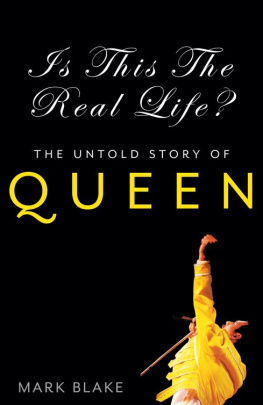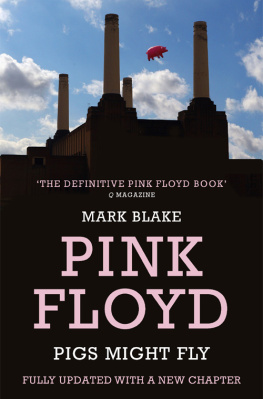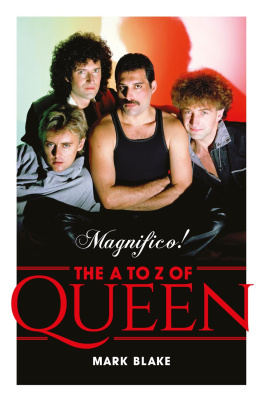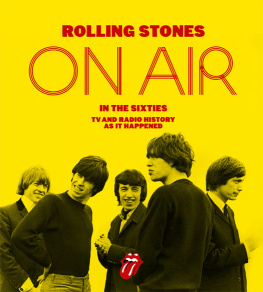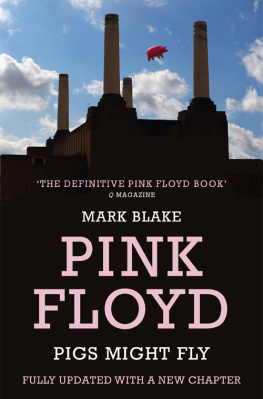PRETEND YOURE
IN A WAR
THE WHO AND THE SIXTIES
BY MARK BLAKE

CONTENTS
FOREWORD
V isitors to Pete Townshends office in Richmond, south-west London, will find a gleaming Vespa scooter parked against one wall and the remains of a shattered electric guitar on another. In between are framed pop-art images and, on the table between us, a couple of Carnaby Street-style souvenir mugs. Wherever you sit in the room, the eye is drawn towards these visual reminders of the 1960s.
It is 3 October 2012, and Pete Townshend is talking about his soon-to-be published autobiography. Despite the surrounding objects, The Whos guitarist and songwriter hasnt tried to cling on to his youth. Theres no sign of the Union flag jacket he wore on the cover of the Observer colour supplement in March 1966. Instead, Townshend favours an elegant waistcoat over a raffish pale pink shirt. These days, the nose that once seemed so prominent in that famous Observer photograph suits the sixty-seven-year-old face surrounding it.
Today, Townshend cant stop talking. In fact, he talks for two and a half hours, only pausing to sip from his souvenir mug. He talks about discovering there was a local criminal (an awful, awful man) hiding under Roger Daltreys bed when he auditioned for what became The Who, and he talks about how much he adored his ex-manager Kit Lambert (even when I was punching him in the face). He also talks about first wanting to write a book about his life, when he was twenty years old in 1965. About art, music and the post-war scene, he says, almost wistfully. Inevitably, our conversation turns to the abuse he suffered as a child, and which has, subconsciously or otherwise, informed so much of his songwriting. I dont remember what happened, he states emphatically, but I dont want to know all the details.
What Townshend has to say is always fascinating, sometimes indiscreet, often amusing and occasionally sad. Some of his stories are probably exaggerated (I saw a policeman murdered in front of me, he claims at one point), their veracity lost to repetition and the passage of time. But it doesnt matter, because everything he says today is worth hearing.
This isnt the first time Ive met Townshend or a member of The Who. Fifteen years earlier, Id been asked to interview him and bass guitarist John Entwistle at the music magazine Qs annual awards ceremony. That day, Townshend slipped away before anyone had the chance to speak to him, leaving Entwistle to collect The Whos award, and apologise for his absent bandmates, remarking drolly that only dead drummer Keith Moon had a valid excuse for not turning up.
Hours later, Entwistle was ensconced at a table in the tiny London club that was hosting the post-awards party. It was 1997, arguably the last boom year for Oasis, Blur and Britpop, and there were plenty of Who acolytes in the room. A stream of musicians and industry folk, many in a highly refreshed state, stopped by the table to offer their appreciation or mutely shake Entwistles hand. The contents of the now-empty bottles of red wine on the table had left most of us feeling rather fuzzy, but Entwistle, whose glass was never less than half full, seemed unaffected.
Unfortunately, four decades spent in front of an earthshakingly loud PA system had left The Whos bass player partially deaf, and he now spoke in a low, lugubrious drawl. Still, Entwistle served up anecdotes about The Whos wild years like a seasoned after-dinner speaker, giving his admirers, with their imitation Keith Moon haircuts and pretend drug habits, what they wanted to hear.
Nine years later, Entwistle had passed away, and I found myself waiting for what was left of The Who at another Q awards bash. This time it was Townshend and lead vocalist Roger Daltrey. That afternoon, Townshend ignored my greeting, preferring to stare through me as if hed glimpsed a ghost on the other side. I wasnt offended or surprised. One of The Whos confidantes had told me that he could ascertain within two seconds of Pete Townshend entering a room what kind of mood he was in, and that it wasnt always a good one. Today was one of those days.
Townshend had fought and won some well-publicised battles with drugs and alcohol, and in 2003 he had been arrested after admitting to using his credit card to try and access online child pornography. He told the police and the press that hed been researching his autobiography and attempting to work through his childhood traumas. A year earlier, though, Townshend had published an essay on his website in which hed mentioned his childhood abuse, expressing his outrage at the ease with which illegal pornography was available online. When no incriminating evidence was found on any of his computers, Townshend was released without charge. But, at this meeting, his doleful expression and glum silence suggested he was carrying the weight of the world on his shoulders.
In contrast, Daltrey, with his wiry physique and drill sergeants demeanour, resembled a man whod spent the past forty years doing a hundred sit-ups before breakfast and strictly observing NHS guidelines on alcohol intake. In recent years Daltrey had started wearing tinted spectacles of the kind only worn by other members of the rock aristocracy. They offered a subtle barrier against the rest of the world, but Daltrey was as loud as Townshend was quiet. He shook hands, laughed easily and answered questions hed been asked countless times before, always about the past.
I would meet and interview Daltrey again several times over the coming years. What emerged from these encounters, and from interviews with Entwistle and Townshend, is how The Who carried the past around with them, almost like another member of the band. It had been this way forever. By the end of the 1960s, a mythology had grown up around The Who, fuelled by tall tales of violence and hedonism, all of which seemed to go hand in hand with My Generation and I Cant Explain; songs that defined both The Who and the era.
Townshend has never taken the approach favoured by his contemporary Mick Jagger, who cuts short too much talk about the old days with the words: That was a long time ago. A long time ago is a subject Pete Townshend can never escape from, because it still has so much bearing on his music, even in the present day.
What Townshend and Jagger, like John Lennon, Paul McCartney, Ray Davies and every figurehead of British 1960s pop have in common is a childhood and adolescence lived in the shadow of the Second World War. More so than the Rolling Stones, The Beatles or The Kinks, though, it is The Who whose music has been most shaped by this post-war landscape and its often-damaged inhabitants.
For The Who, growing up in the 1940s and 1950s, the past was somewhere to escape from but it was inescapable. It was there every day in the faces of their relatives and neighbours. We felt deeply affected, said Townshend, and our parents and our grandparents had been deeply affected. It was there in The Dambusters, The Cruel Sea and every other flag-waving war film screened at their local fleapit cinemas. And it was there in the tales of wartime heroism splashed across the comics they read, and in the bloody battles they re-enacted on the bombed-out ruins that surrounded their homes.
The 1960s was an era of reinvention that saw a concerted attempt to right the wrongs of previous decades. The music The Who made in the 1960s aspired to this brave new world, while still being haunted by the smoking battles of the old one. It was a music that grew out of bomb sites, ration books and unspoken childhood secrets, but also the great social and artistic changes sweeping through the new decade.


